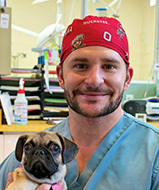A Spoonful of Sugar Helps the Medicine Go Down
It's the one job that all pet owners dislike—convincing a pet to take his medicine. Whether it's a tablet or liquid, dogs and cats notoriously are averse to taking their medications, and all too often, it results in doses being missed and pet owners being exasperated. This is not good for anybody, but it's bad for your pet because he needs his medicine if he is going to get better.
What can you do to help improve the odds that your pet follows his treatment regimen? Here are eight creative tips and tricks to try the next time your pet is prescribed medications.
#1: Hide the Medicine in Wet, Strong-Smelling Food
Dogs and cats have much keener senses of smell than humans. It's that sense that tips them off that you're trying to slip them some medicine. One way to overcome that problem is to hide the medicine in wet, strong-smelling food. The smell of the food will hide the scent of the medicine and your pet will be naturally drawn to it.
#2: Give Everybody a Treat
If you have more than one dog in your home, then you know all about the ruckus they cause when you're handing out treats. You can use this competition to your advantage. Slip the medicine in one treat and give the treats out, making sure you give the pilled treat to the dog who needs it. Because dogs tend to eat faster in such competitive situations, your dog will gulp his treat so quickly that he won't know he's taking his medicine.
#3: Make It into a Game
Take a couple of treats and insert the medicine into one of them. Then, play a game with your dog, tossing him a treat to see if he can catch them. He'll be so into the game that when you toss the treat with the pill, he won't even notice.
#4: Put the Medication in a Capsule
Some medications can be especially bitter tasting to a dog or cat, even when they're inserted into food or treats. For these medications, you can purchase empty gel caps and insert the tablet inside. This way, the gel cap will ensure your pet isn't able to taste the objectionable medicine.
#5: Don't Let Them See You Prepare the Medication
Dogs and cats are observant and smart. They can see you preparing their medication and they know it's coming. Don't let them see you. Prepare a few doses by putting them in food or treats and put them in the refrigerator. Then, when you're preparing breakfast, lunch, or dinner, just let the treat “accidentally” fall to the floor. Your dog will scoop it up thinking he just scored a free snack.
#6: Take Him for a Walk
Take your dog for a walk and mid-way through, stop and give him a dosed treat. He'll gladly take it because he is distracted from the act of taking his medicine. With so much to see and smell outside, he will be more interested in other things than what's inside his treat.
#7: Put It on the Paws
If your pet has been prescribed a powder or liquid, try mixing it with some peanut butter and spread it on his paws. This works for two reasons—dogs don't like anything on their paws and dogs love peanut butter. Your dog will lick the peanut butter off his paws, and he'll get his dose of medicine at the same time.
#8: Have the Medication Formulated into a Tasty Treat
If your veterinarian prescribes your pet a medication, you can get the prescription filled through a veterinary compounding pharmacy. You can have the medication compounded into ready-to-give treats in a variety of flavors that your pet will find irresistible.
This offers a simple and direct way to ensure that your pet will get his precise dosage of his medicine, every single time. And, because the treats are so tasty and appealing, you'll never have to fight your pet at medicine time because he'll be excited to get his treat.
About the Author

Dr. Evan Ware is a veterinary practitioner in Phoenix, Arizona. He received both his undergraduate degree in microbiology and his Doctorate of Veterinary Medicine from The Ohio State University.
Dr. Ware is currently the Medical Director of University Animal Hospital (VCA) and is also the owner of two other hospitals, including Laveen Veterinary Center and Phoenix Veterinary Center. His areas of expertise include orthopedic medicine and surgery, veterinary oncology and chemotherapy, and general and advanced soft-tissue surgery.